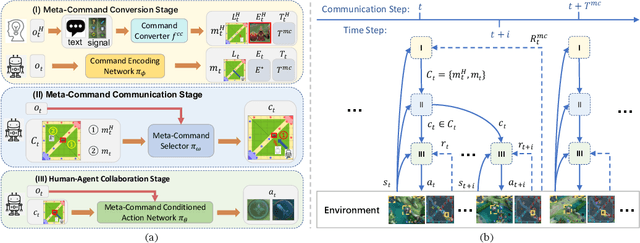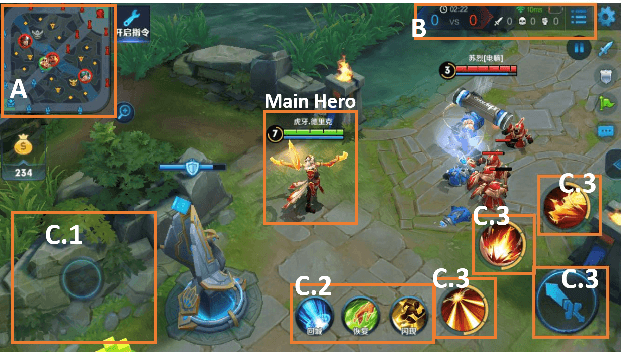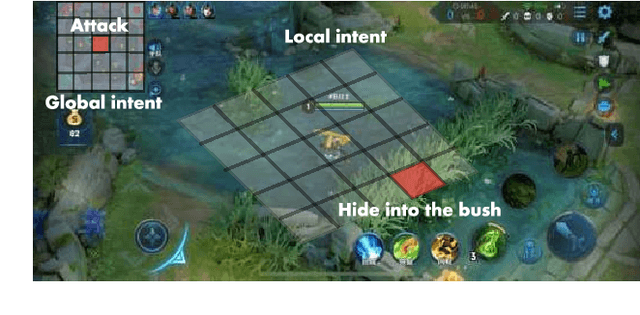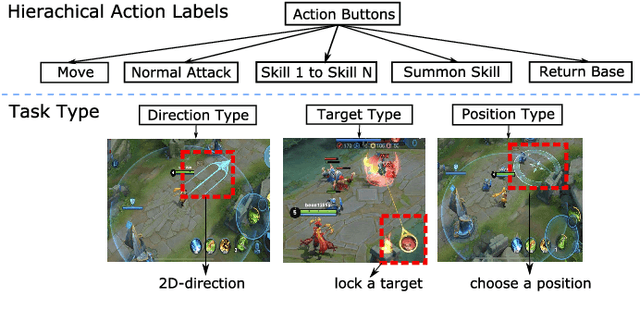Zhenjie Lian
Enhancing Human Experience in Human-Agent Collaboration: A Human-Centered Modeling Approach Based on Positive Human Gain
Jan 28, 2024



Abstract:Existing game AI research mainly focuses on enhancing agents' abilities to win games, but this does not inherently make humans have a better experience when collaborating with these agents. For example, agents may dominate the collaboration and exhibit unintended or detrimental behaviors, leading to poor experiences for their human partners. In other words, most game AI agents are modeled in a "self-centered" manner. In this paper, we propose a "human-centered" modeling scheme for collaborative agents that aims to enhance the experience of humans. Specifically, we model the experience of humans as the goals they expect to achieve during the task. We expect that agents should learn to enhance the extent to which humans achieve these goals while maintaining agents' original abilities (e.g., winning games). To achieve this, we propose the Reinforcement Learning from Human Gain (RLHG) approach. The RLHG approach introduces a "baseline", which corresponds to the extent to which humans primitively achieve their goals, and encourages agents to learn behaviors that can effectively enhance humans in achieving their goals better. We evaluate the RLHG agent in the popular Multi-player Online Battle Arena (MOBA) game, Honor of Kings, by conducting real-world human-agent tests. Both objective performance and subjective preference results show that the RLHG agent provides participants better gaming experience.
Towards Effective and Interpretable Human-Agent Collaboration in MOBA Games: A Communication Perspective
Apr 23, 2023



Abstract:MOBA games, e.g., Dota2 and Honor of Kings, have been actively used as the testbed for the recent AI research on games, and various AI systems have been developed at the human level so far. However, these AI systems mainly focus on how to compete with humans, less on exploring how to collaborate with humans. To this end, this paper makes the first attempt to investigate human-agent collaboration in MOBA games. In this paper, we propose to enable humans and agents to collaborate through explicit communication by designing an efficient and interpretable Meta-Command Communication-based framework, dubbed MCC, for accomplishing effective human-agent collaboration in MOBA games. The MCC framework consists of two pivotal modules: 1) an interpretable communication protocol, i.e., the Meta-Command, to bridge the communication gap between humans and agents; 2) a meta-command value estimator, i.e., the Meta-Command Selector, to select a valuable meta-command for each agent to achieve effective human-agent collaboration. Experimental results in Honor of Kings demonstrate that MCC agents can collaborate reasonably well with human teammates and even generalize to collaborate with different levels and numbers of human teammates. Videos are available at https://sites.google.com/view/mcc-demo.
Learning Diverse Policies in MOBA Games via Macro-Goals
Oct 27, 2021



Abstract:Recently, many researchers have made successful progress in building the AI systems for MOBA-game-playing with deep reinforcement learning, such as on Dota 2 and Honor of Kings. Even though these AI systems have achieved or even exceeded human-level performance, they still suffer from the lack of policy diversity. In this paper, we propose a novel Macro-Goals Guided framework, called MGG, to learn diverse policies in MOBA games. MGG abstracts strategies as macro-goals from human demonstrations and trains a Meta-Controller to predict these macro-goals. To enhance policy diversity, MGG samples macro-goals from the Meta-Controller prediction and guides the training process towards these goals. Experimental results on the typical MOBA game Honor of Kings demonstrate that MGG can execute diverse policies in different matches and lineups, and also outperform the state-of-the-art methods over 102 heroes.
Supervised Learning Achieves Human-Level Performance in MOBA Games: A Case Study of Honor of Kings
Nov 25, 2020



Abstract:We present JueWu-SL, the first supervised-learning-based artificial intelligence (AI) program that achieves human-level performance in playing multiplayer online battle arena (MOBA) games. Unlike prior attempts, we integrate the macro-strategy and the micromanagement of MOBA-game-playing into neural networks in a supervised and end-to-end manner. Tested on Honor of Kings, the most popular MOBA at present, our AI performs competitively at the level of High King players in standard 5v5 games.
 Add to Chrome
Add to Chrome Add to Firefox
Add to Firefox Add to Edge
Add to Edge